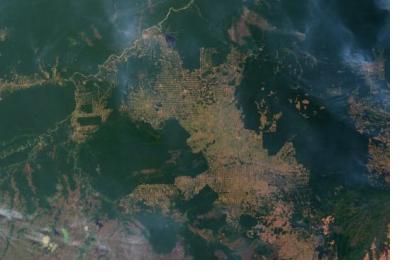The National Remote Sensing Centre (NRSC), a programme under the auspices of the Indian Space Research Organization (ISRO), has engineered a new monitoring system to observe forest cover change and combat deforestation. By combining optical remote sensing, geographic information system, artificial intelligence and automation, the new system allows monitoring experts to detect small-scale deforestation to further limit the damage caused to forests and to improve the frequency of reporting from once per year to once per month.
Since 2014, forests across India have suffered from a 105% increase in deforestation. Additionally, whereas forest cover change in India used to take place on a large-scale level of several hectares, it now often occurs in small areas of 1 hectare or less.
Deforestation has a number of disaster-related implications. On the one hand, it has a negative effect on the carbon cycle and thus contributes to global warming, causes air pollution and reduces oxygen levels in the atmosphere. On the other hand, it impacts the Earth’s water cycle as forests transpire large quantities of water into the atmosphere. Thus, a decline in forest cover impedes the formation of clouds, which increases the probability of permanent drought and wildland fires.
The NRSC’s previous systems had difficulties in monitoring changes of small tracts of forest lands; an issue which has now been solved by improving the resolution for Optical Remote Sensing from 50 metres to 30 metres.
Moreover, the NRSC’s new system enables scientists to process satellite imagery at a much quicker rate, reducing the time frame for new reports from 12 months to just four weeks. With the new technology, the ISRO aims to prevent negative changes in green cover and to protect wildlife.
This technological progress will help the NRSC to produce time-efficient, reliable and regularly updated information to improve its decision-making process for disaster management. Thus, the new system presents another major step where space-based information has immensely contributed towards maintaining ecological balance and consolidating early warning systems.

